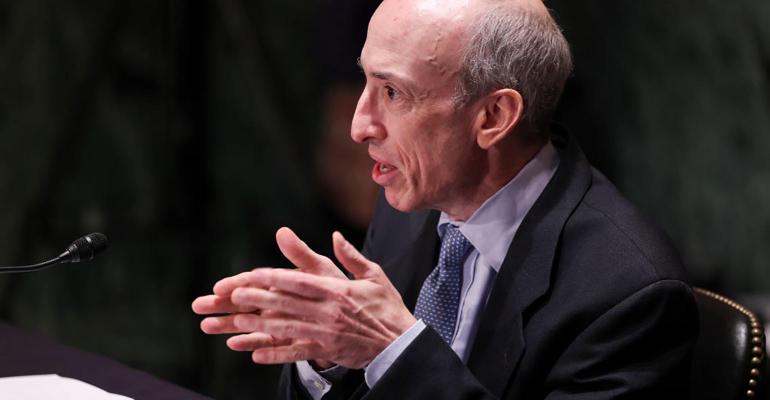(Bloomberg) -- US regulators will take the first step Wednesday toward the most widespread revamp in more than a decade of the way stocks are traded, a move that the agency says will spur better prices for investors and direct more business to traditional exchanges.
The Securities and Exchange Commission laid out four proposals that Chair Gary Gensler says would boost transparency and competition. They delve into the guts of how the $43 trillion market works, and affect everything from order routing to pricing and disclosures that brokers must make to clients.
The SEC’s plans, which will be debated by commissioners during an agency meeting, represent a direct response to many of the issues that were spotlighted by last year’s meme-stock-trading craze. Over the past year, the contours of the effort have been a source of significant angst for the industry as Gensler signaled that major overhauls loomed.
Read More: Why the SEC Is Focused On ‘Payment for Order Flow’: QuickTake
On Wednesday, the SEC chief doubled down. “Today’s markets are not as fair and competitive as possible for individual investors — everyday retail investors,” Gensler said in remarks ahead of the meeting. Taken together, the rule changes would be the biggest since 2005.
Broadly, the plans could lead to more stock orders filled on exchanges like Nasdaq and the New York Stock Exchange. Currently, a significant chunk of retail trades are handled by by wholesale brokerages like Virtu Financial Inc. and Citadel Securities, which pay for the right to process customer trades from firms like Charles Schwab Corp. and Robinhood Markets Inc.
Virtu shares fell by as much as 6.3% in New York trading, the biggest intraday decline since Sept. 6, while Robinhood dropped by as much as 4.4% before rebounding.
Gensler has frequently criticized the arrangement, which is commonly known as payment for order flow, as creating conflicts of interest for brokers and had floated banning the practice. Meanwhile, wholesale brokerages like Virtu and Citadel have pushed back, arguing that it’s beneficial to retail traders and allows them to get the best price and have trades efficiently filled.
Notably, the SEC won’t call for banning the practice. Instead, the proposals would require market participants to engage in auctions for the right to process many orders within milliseconds. That requirement would apply to most market-making firms and major stock exchanges.
Read More: SEC Set to Let Wall Street Keep Payment-for-Order-Flow Deals
In another planned change, the regulator also wants to reduce the rebates that exchanges can offer brokers in their own bid to pull more trades onto those platforms. Platform operators would have to start making their fees publicly known in advance, rather than after the fact based on volume within a given month.
The SEC estimates that the auctions could save retail investors $1.5 billion annually.
If implemented, the auctions could directly affect market-making firms that have built algorithms and technology to process trades quickly and provide what they say is the best deal for customers. The changes would also alter the exchange venue’s existing business models, which charge for data and access to trading on their venues.
Trading venues would also need to start allowing stocks to trade at smaller price increments on and off exchanges. The move, according to the SEC, would increase competition to fill orders and lower costs. The agency is also proposing to reduce other fees, which could drive more trading to the platforms.
Once a majority of the SEC’s five commissioners vote to propose the changes as expected on Wednesday, the agency will take comments on them through March. Staff will then take those recommendations into account and write a final version that the commissioners will have to approve for the regulations to take effect.





